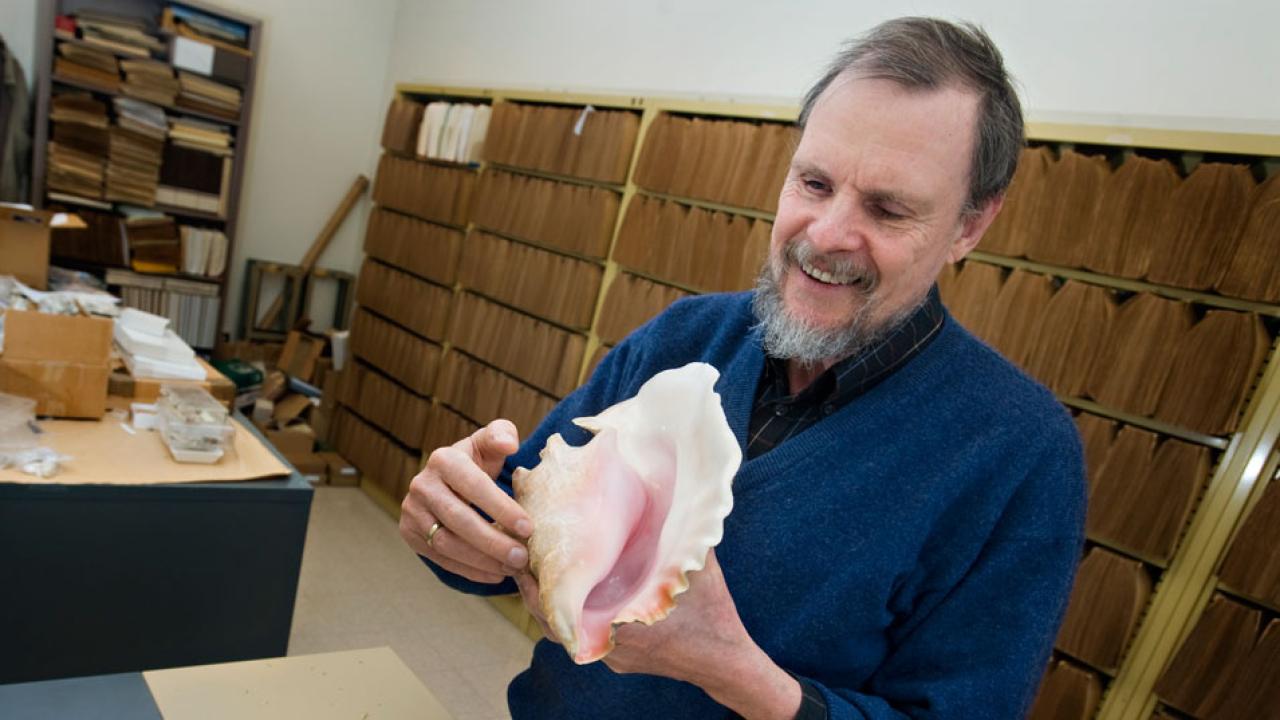IN THIS COLUMN
- Gerrat Vermeij documents the “arms race” among long-extinct mollusks and their predators
- GSM faculty members make award-winning impact with “Impact Investing” study
- One Health leader Jonna Mazet receives Vet Med’s Zoetis Award for Research Excellence
- Konstantinos Papamichael, Michael Siminovitch, 2 others share award for paper on color-quality lighting research
Geerat Vermeij, distinguished professor of marine ecology and paleoecology, recently received the Addison Emery Verrill Medal from the Yale Peabody Museum of Natural History.
The award recognizes “signal practitioners in the arts of natural history and natural sciences.” Vermeij, a member of the Department of Earth and Planetary Sciences, has transformed the field of evolutionary biology and advanced the field of paleobiology by addressing the profound influences that organisms have on one another’s evolutionary histories.
He is perhaps best known for his work documenting the “arms race” among long-extinct mollusks and their predators. He shared his knowledge in a video for the acclaimed PBS series Shape of Life: The Story of the Animal Kingdom.
The Verrill Medal presentation brought Vermeij back to the university where he received his Ph.D. Getting in was not a sure thing, he recalled in a 1988 address to the National Federation of the Blind. “When I arrived for my interview in the biology department, the director of graduate studies was more than a little apprehensive,” said Vermeij, who has been blind since the age of 3.
“During my talk with him, he took me down to the university’s shell collection in the basement of the Peabody museum. Casually he picked up two shells and asked me if I knew them. He fully expected me to draw a blank, in which case he planned to tell me as gently as possible that biology was not for me after all.
“Fortunately, however, the shells were familiar to me. All of the misgivings of the director instantly evaporated.” Vermeij would go on to earn his doctorate in biology and geology in 1971 — and today he has the Peabody’s highest honor, the medal that is named for Yale’s first professor of zoology and one of the Peabody’s first curators.
UC Davis and UC Berkeley business faculty made quite an impact with their “Impact Investing” study — so much so that it recently received this year’s Moskowitz Prize for Socially Responsible Investing, given Nov. 9 in Denver at the 27th annual SRI Conference.
The prize went to Brad Barber, the Gallagher Professor of Finance and associate dean of Academic Affairs, UC Davis Graduate School of Management; Ayako Yasuda, associate professor of finance, GSM, and visiting associate professor of finance, UC Berkeley Haas School of Business; and Adair Morse, associate professor, who teaches “New Venture Finance” at the Haas School of Business.
The 21-year-old Moskowitz Prize, determined and managed by the Center for Responsible Business at the Haas School of Business, is the only global award that recognizes outstanding quantitative research in the field of sustainable, responsible, impact investing. The award is named for Milton Moskowitz, one of the first investigators to publish comparisons of the financial performance of portfolios screened for social and environmental issues and impacts.
Barber, Yasuda and Morse, in their “Impact Investing” abstract, define impact funds as “venture or growth private equity with a stated intent to generate both financial returns and positive externalities.”
“In a choice-of-funds framework covering 3,500 limited partners, 5,000 funds and 25,000 capital commitments, and controlling for general determinants of fund choice, we find a 13.5 percent higher investment rate for impact funds compared to the benchmark investment rate of traditional venture funds,” the abstract states. “Our results imply that the supply of impact funds is incomplete, failing to meet demand.”
The study found the pinch is most acute in Europe where the demand for impact investing (versus traditional investments) is three times higher than in the United States and the rest of North America.

Professor Jonna Mazet recently received the School of Veterinary Medicine’s Zoetis Award for Research Excellence, given annually to faculty members. The school’s Office of Research and Graduate Education accepts nominations for the award, and the Research Committee does the selecting.
The award not only honors research effort and productivity, but serves to foster the innovative research that is needed to keep the profession moving forward.
Mazet, a member of the National Academy of Medicine, is a professor of epidemiology and disease ecology; and the executive director of the School of Veterinary Medicine’s One Health Institute, which works to advance global health at the animal-human-environment interface. The institute’s research endeavors include disease conflict in Yellowstone National Park, pathogen pollution of California coastal waters and tuberculosis in Africa.
In addition, she’s the global director of PREDICT, a $175 million viral emergence early warning project now in its second five-year phase. PREDICT is part of the U.S. Agency for International Development’s Emerging Pandemic Threats Program and led by the One Health Institute.
PREDICT, covering 24 developing countries, uses geospatial modeling, genomics, molecular virology and targeted field studies in a surveillance system for zoonotic diseases emerging from wildlife, and labeled zoonotic because they can spread to people.
The Illuminating Engineering Society of North America recently honored professors Konstantinos Papamichael and Michael Siminovitch and two others for a paper they published in LEUKOS, the society’s journal.
Papamichael and Simonovitch, of UC Davis’ California Lighting Technology Center, share the Taylor Technical Talent Award with Jennifer A. Veitch of National Research Council Canada and Lorne Whitehead of the University of British Columbia for “High Color Rendering Can Enable Better Vision Without Requiring More Power.”
The award recognizes outstanding application papers published in LEUKOS or LD+A, or presented at the IES annual conference or at a regional conference.
The winning paper focuses on the idea that people need not sacrifice color fidelity for energy efficiency, and notes that high color rendering fidelity is likely to lead to broader market acceptance of energy-efficient lighting. This research provided input to California’s 2016 Building Energy Efficiency Standards and Appliance Efficiency Regulations, which apply to new home and building construction and to new appliances sold in California.
Dateline UC Davis welcomes news of faculty and staff awards, for publication in Laurels. Send information to dateline@ucdavis.edu.
Media Resources
Dateline Staff, 530-752-6556, dateline@ucdavis.edu
